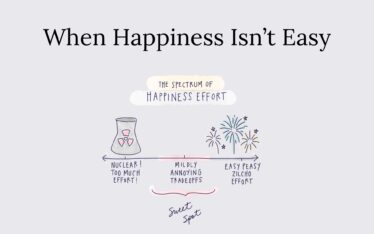I’ve written about life-affirming things for the last eight weeks, so I’m about seven weeks overdue to talk about you and your pending demise. Humor me here for a bit, okay? (And nod with me that you know my Death Diatribes are actually all about living life like we mean it, right? Death as the portal to living, death as the “wake the fuck up!” call to live like we’ve been warned we won’t live forever… that sort of thing? Okay yep, we’re good.)
Researchers have wisely noted that “the meanings of death and life are interdependent. Life gains its meaning from the fact of death. How, when, where, and why one anticipates dying influences the meaning of the life that one has. Conversely, how one lives, in terms of accomplishments and failures, struggles and challenges, changes in the circumstances of life, and the cumulative effect of many diverse experiences influences one’s personal meaning of death.” Life cannot be delicious without the idea of death, just as death can’t do its thing without a life to snuff out: it’s a wonderfully symbiotic relationship.
The “What Does Your Death Mean to You?” Scale:
Check out these 30 “meanings statements” that researchers cooked up from a myriad of academic sources. What is the extent to which each statement represents the meaning that death has for you personally? (Imagine a 5-point scale where 1 means you strongly disagree and 5 means you strongly agree.)
- Death means pain and suffering.
- Death means personal extension.
- Death means the end of one’s dreams.
- Death helps give meaning to life.
- Death is a relief from the struggles of life.
- Death challenges one to take high risks.
- Death provides the opportunity for our accomplishments to be evaluated for posterity.
- Death makes us all equal.
- Death means separation from our loved ones.
- Death means reunion with our loved ones.
- Death means the opportunity to attain symbolic immortality (leave a legacy).
- Death means the opportunity to die nobly, to die with honor and glory for a cause.
- Death means the elimination of adversaries, outliving competitors.
- Death means eternal punishment.
- Death means loss.
- Death means the beginning of something beyond.
- Death is absurd.
- Death is sexually exciting.
- Death is the impetus for setting goals.
- Death is the beginning of a new adventure.
- Death makes us all humble.
- Death motivates us to achieve.
- Death motivates us to provide an inheritance for our children.
- Death is an opportunity to be eulogized for our great accomplishments.
- Death makes us concerned with others more than ourselves.
- Death makes us live to prepare for it.
- Death means that life is uncertain.
- Death is remote from everyday life.
- Death is a disease that medicine will cure.
- Life gives death meaning.
(I too am furrowing my brow about #18, so let’s just move swiftly on from that little gem.)
The scale above measures how we view death along four dimensions:
- Death as Afterlife (replete with pearly gates) — items 2 (reversed), 10, 16, 20.
- Death as Extinction (when we’re done, we’re done) — items 1, 2 (reversed), 3, 9, 15.
- Death as Legacy (leaving something of value behind for others to benefit from) — items 7, 11, 12, 13, 24.
- Death as Motivator (the kick in the pants to set and reach goals in life) — items 4, 7, 19, 22, 30.
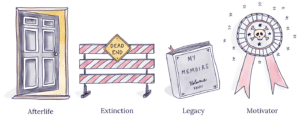
Things we know to be true about our attitudes towards death:
The meanings we attach to death, as multidimensional as they are, act as triggers for our emotions, motivations, and actions.
Research shows that those who feel negatively about death also tend to feel negatively about their lives; conversely, those who adopt a neutral acceptance towards death show statistically positive relationships to happiness. Individuals who believe they’ve lived either a physically or emotionally deprived life “believe that to die now would be intolerable.”
Researchers have also studied death attitudes through the content analysis of free-form narrative responses to such cushy questions as, “What is your personal philosophy of death?” and “What is death? What does it mean to you?” Over 60% of respondents wrote about their death as having a purpose with a reference to a continued existence in an afterlife. Less healthy respondents wrote about death as more purposeless. Un-shocking to anyone, academics have found that females tend to be more open to the contemplation of death, whereas males tend to favor avoidance on the unsavory subject.
In one study, younger adults identified with death as a motivator more than older adults who have presumably accomplished many of their hopes and dreams — although qualitative research has shown that older adults are still motivated to wrap meaningful goals up (like completing the family tree project or coaching a youngster in the family).
Research on thanatophobia (fear of death or dying) has revealed that adult children experience more anxiety about death than their elderly parents tend to. We assume that those near death’s door are shaking in their boots, but no. Elderly folks are more afraid of the dying process than their grown kids, but older people tend to have accepted death as an inevitable construct… while their kids are still very much uncool with it. Apparently this gets in the way of important end of life discussions, as adult children avoid the topic of death with their parents and miss the chance to plan for a “good death” (because there is such a thing).
Seeing your death as an opportunity to leave a legacy often creates a reassuring symbol of immortality. Having kids, starting a business, donating to the library and getting a plaque with your name on it… any way to create a feeling that you’ll live on beyond your body can alleviate anxiety. The same can be said for those who see death as a motivator (which is basically the reason I wake up every day, to convince you all of this fact); the forward momentum that comes from taking death-inspired action on the things that matter to us help us feel like we’re living lives of purpose.
Negative death attitudes: we mellow as we age
This is the clearest chart ever to show that we’re all jacked up about death when we’re young, and then we chill the fuck out as we age and accept that death really is a part of life (the y-axis reflects average scores of death avoidance and fear):
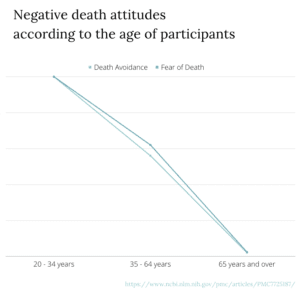
Rationale for negative death attitudes:
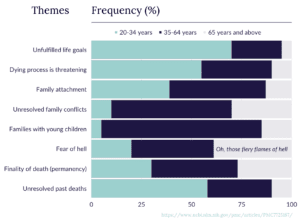
This is where things get juicy.
If we happen to be down on death, when we’re young it’s because we fear we won’t have reached the goals we’ve set for ourselves before we kick the bucket (e.g.: having a family, getting the job of our dreams, finishing school, going to Morocco, etc.). When we’re middle-aged it’s mostly about family: we fear death because it means we’ll leave our kiddos behind, make a widow/ widower of our partner, or never resolve The Great Family Drama of 2012 with Uncle Jed and cousin Teena. When we’re older, our beefs with death are actually pretty minimal, other than fear of the eternal flames of hell and damnation.
Rationale for positive death attitudes:
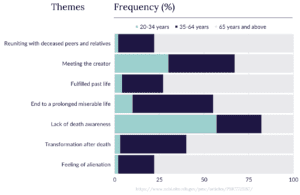
For the equanimous folks out there with a less bitter view of the bitter end, they are positive about death for different reasons across the lifespan. The 20 – 34-year-olds get to bathe in ignorant bliss, okay with death because of its elongated distance on the horizon. After 65, those who’ve come to terms with the idea of death believe they’ll get to carouse with their lost loved ones, meet their Maker, and stop being so lonely because all their friends have long since left them in the dust. (The relationship between religiosity and death anxiety is inconclusive; some studies say that “death anxiety theories of religion generally predict an inverted-U relationship between death anxiety and religiosity, specified death anxiety was reported lowest among very non-religious as well as very religious individuals.” So it pays to be either fully atheistic or fully devout… but not on the fence?)
So now what?
I believe there are several implications from these charts, but I am going to zero in on two of the related biggies.
People who have a positive attitude towards death feel like they have had a fulfilling life.
People who have the heebie-jeebies about death (at least when they’re under 65) feel like they haven’t met/ might not meet their life goals.
How can you live a life that sets you up to meet your goals? Are your goals realistic or unreachably far-fetched?
How can you lead a fulfilling life? What does “fulfilling” specifically mean to you?
What are two steps forward you can take to reach an important goal, and feel fulfilled?
Words of encouragement to practice memento mori:
Existential psychotherapists and philosophers are convinced of the upsides of memento mori (quick reminder: memento mori is the ancient Latin phrase that translates to “remember we must die”).
Believing that the acceptance of our finitude creates a portal to self-knowledge, psychologists maintain that the energy spent suppressing the irksome facts of finality could be better invested in the positive and creative aspects of being… of living (and why not with gusto?!).
Some academics note the acknowledgment of death arouses a sense of wonder, which flips the script on life and turns it into an enigmatic riddle to figure out our destiny. Relating to death in a deliberate fashion provides an existential jolt that just might lead to a transcendence of our daily existence — awakening us from what Schumacher refers to as the drowsiness of the human condition that denies death as an experience to reflect upon. (We don’t want to feel drowsy, do we? *Yawn*… nope.)
Join me in thinking about your “ultimate life event” (no, not the monster truck rally coming to your town). The more we cultivate a positive acceptance towards death (okay fine — a neutral attitude at least), the more we have to gain by putting our life goals and priorities into focus. If the idea of death scares the shit out of you, a) go see an existential therapist, b) start taking meaningful action in your life (which only you will know that that means for you). If the idea of death is just fine to you, come join me by the fire where we’ll put our feet up, raise a glass to this life we’re trying to make the very best of, and hope we don’t end up in hell.

Oh and just in case you missed it… please take 16 minutes out of your life to watch my TEDx talk!






